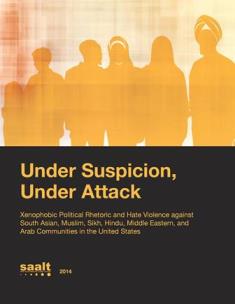This post was previously published at the Asian Pacific Americans for Progress blog as part of the Asian Pacific American Week of Action on immigration reform.
Before I started law school, I had definitely heard the term “due process.” I have to confess, though, I wasn’t really sure what it meant. All I knew is that it sounded good, seemed to be a core American value, and was rooted in fairness. It was something that this country prided itself on as a hallmark principle that came down from our Founding Fathers.
When we talk about immigration, there is often talk about due process violations affecting the lives of immigrants, but what does that really mean? Of course, we could always turn to our trusted friend, the Webster’s Dictionary for some guidance: “legal proceedings that are carried out following established rules and laws that result in unfair or arbitrary treatment of individuals.” (The legal eagles among us can rely upon the definitive Black’s Law Dictionary for some fancier and technical language, too.) But these lofty and abstract definitions did not hold much traction for me. It wasn’t until I encountered the real life experiences of immigrants whose due process rights were violated that I understood why this value is so dear and needs to be protected in our country’s immigration system.
Below are just a few examples spotlighting South Asians seeking asylum that made clear to what due process (or the lack thereof) truly means.
Due process means access to legal representation and legal information: Monisha, originally from Pakistan, was an honors graduate from UC Berkeley who came from Mumbai to Texas to seek asylum with her parents and brother when she was ten years old. While in India, her father was very involved in the local Muslim community — as a result of his activities, thier family became the target of Hindu fundamentalist groups. They were denied asylum because their attorneys failed to meet necessary filing deadlines. Immigration authorites later arrested her parents and brother and placed them in deportation proceedings. Navigation the complex world of immigration law is often worse for those who do not have lawyers and have to represent themselves because immigrants facing deportation are not guaranteed an attorney. Does it seem fair that accurate legal information and competent representation is often unattainable particularly when the immigration system is so complicated?
Due process means ensuring that immigrants are not criminalized and placed in detention: Harpal, a Sikh man, chose to be deported back to India where he had been tortured, rather than languish in limbo in immigration detention. When he arrived in the U.S., he settled in the Bay Area, began working as a truck driver, and applied for asylum. He was later arrested by U.S. government and immigration officials. After being detained for more than eight years in California, much of it in solitary confinement, and tired of waiting for Convention Against Torture claim to be resolved in the courts, he decided to return to a country where officials had previously mistreated him severely. Does it seem fair to lock up individuals for years who have committed no crime and are waiting excessive period of time for their immigration cases to be resolved?
Due process means guaranteeing fairness of immigration court proceedings and case review on appeal: A Sri Lankan woman fleeing persecution in Sri Lanka was denied asylum by an immigration judge who did not believe her case simply because she was “looking up at the ceiling” during testimony. The judge ignored detailed evidence of her fear of return and based denial on this minor point about her demeanor. Even worse, the appellate body, the Board of Immigration Appeals, did not disagree with the judge’s ruling. It was not until a federal court reviewed her case that the initial judge was ordered to consider her case more thoroughly. Does it seem fair that the safety and lives of immigrants depend upon often arbitrary and unfair decisions that can occur in Immigration Courts and are given limited review?
These are just a few stories that you find replicating themselves within the South Asian community that convey in real terms what the lack of due process looks like. As immigration reform moves forward, it is crucial that due process and fundamental fairness be restored to policies and procedures that affect the lives of so many immigrants in this country.
